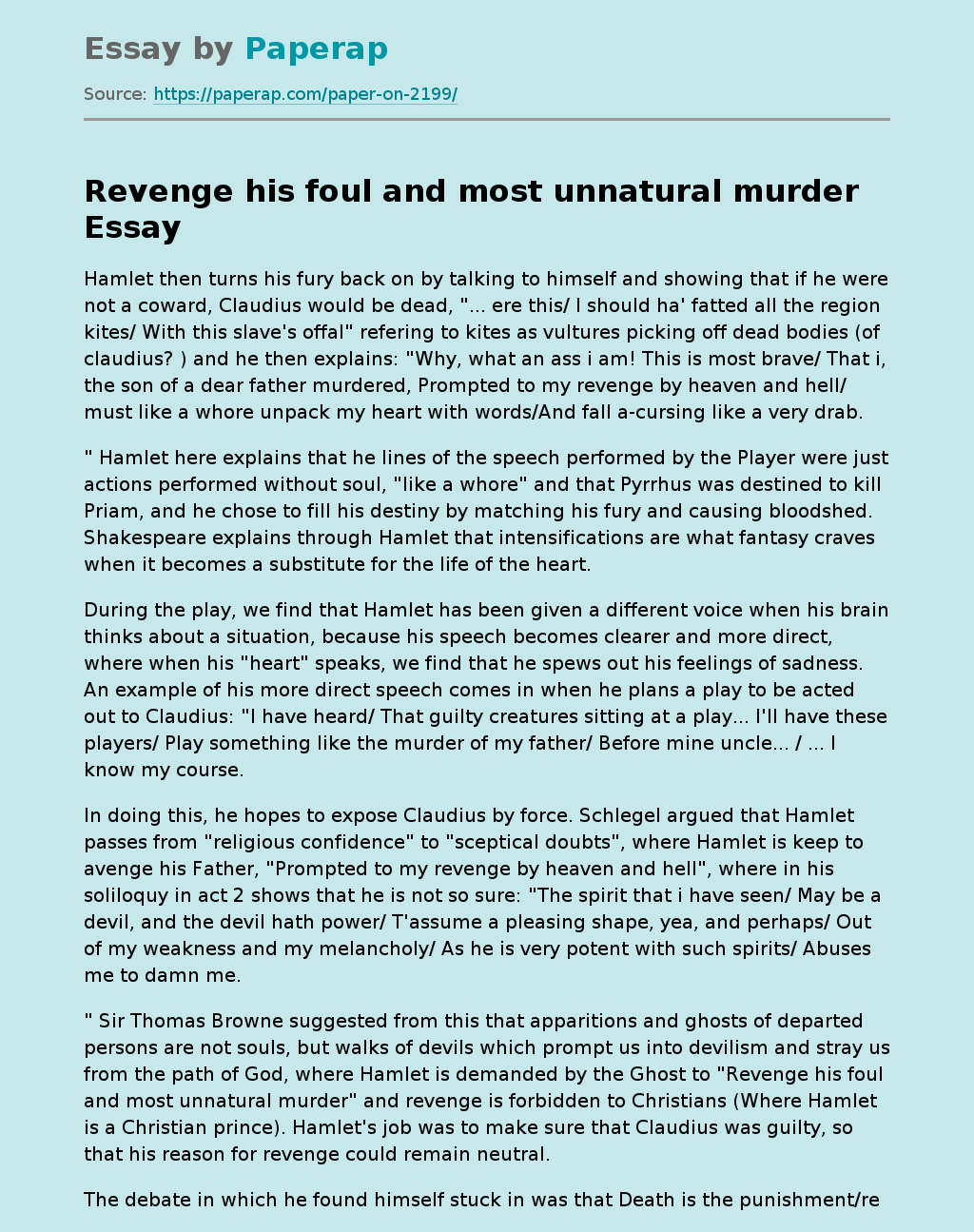Hamlet then turns his fury back on by talking to himself and showing that if he were not a coward, Claudius would be dead, “… ere this/ I should ha’ fatted all the region kites/ With this slave’s offal” refering to kites as vultures picking off dead bodies (of claudius? ) and he then explains: “Why, what an ass i am! This is most brave/ That i, the son of a dear father murdered, Prompted to my revenge by heaven and hell/ must like a whore unpack my heart with words/And fall a-cursing like a very drab.
” Hamlet here explains that he lines of the speech performed by the Player were just actions performed without soul, “like a whore” and that Pyrrhus was destined to kill Priam, and he chose to fill his destiny by matching his fury and causing bloodshed. Shakespeare explains through Hamlet that intensifications are what fantasy craves when it becomes a substitute for the life of the heart.
During the play, we find that Hamlet has been given a different voice when his brain thinks about a situation, because his speech becomes clearer and more direct, where when his “heart” speaks, we find that he spews out his feelings of sadness. An example of his more direct speech comes in when he plans a play to be acted out to Claudius: “I have heard/ That guilty creatures sitting at a play… I’ll have these players/ Play something like the murder of my father/ Before mine uncle… / … I know my course.
In doing this, he hopes to expose Claudius by force. Schlegel argued that Hamlet passes from “religious confidence” to “sceptical doubts”, where Hamlet is keep to avenge his Father, “Prompted to my revenge by heaven and hell”, where in his soliloquy in act 2 shows that he is not so sure: “The spirit that i have seen/ May be a devil, and the devil hath power/ T’assume a pleasing shape, yea, and perhaps/ Out of my weakness and my melancholy/ As he is very potent with such spirits/ Abuses me to damn me.
” Sir Thomas Browne suggested from this that apparitions and ghosts of departed persons are not souls, but walks of devils which prompt us into devilism and stray us from the path of God, where Hamlet is demanded by the Ghost to “Revenge his foul and most unnatural murder” and revenge is forbidden to Christians (Where Hamlet is a Christian prince). Hamlet’s job was to make sure that Claudius was guilty, so that his reason for revenge could remain neutral.
The debate in which he found himself stuck in was that Death is the punishment/relief of God, and if he was to murder Claudius, he would be putting himself in Gods place, i. e blaspheming. Hamlet questioned if assassination was the only way of punishing in practice? Shakespeare gives Hamlet an alternative plan, based on his religious view that murderers “proclaimed their malefactions”, and proclaim meaning to state publicly, which would ultimately dethrone Claudius and save Hamlet from damnation. However, this plan would fail the final request from the Ghost and would oppose his fury.
Shakespeare didn’t let Hamlet follow his own mind because the play would fail as a tragedy. In conclusion, Hamlet’s soliloquys are significant because he, being the main character, has time to explore and share his deepest emotions, ultimately showing how the play is a tragedy, and ideas such as religion within Hamlet’s mind when making decisions such as whether to murder Claudius or not, and lastly his soliloquys show how he consults his heart and his mind, showing his self-discipline and power which in the end makes Hamlet a hero.
Bibliography: * “Hamlet” – William Shakespeare – Heinemann Advanced Shakespeare, 1996 * “Shakespearian Tragedy” – John Drakakis – Longman Critical readers, 1992 * “The Tragedy of Hamlet, Prince of Denmark” – William Shakespeare – Penguin Books, 2002 * “York notes on Hamlet” – Longman Critical Guides, 1980 * “Schlegel” – www. wikipedia. com, Shakespeare and Tragedy * “Sir Thomas Browne” – www. wikipedia. com, Ghosts and apparitions in literature.
Revenge his foul and most unnatural murder. (2017, Jul 28). Retrieved from https://paperap.com/paper-on-2199/

